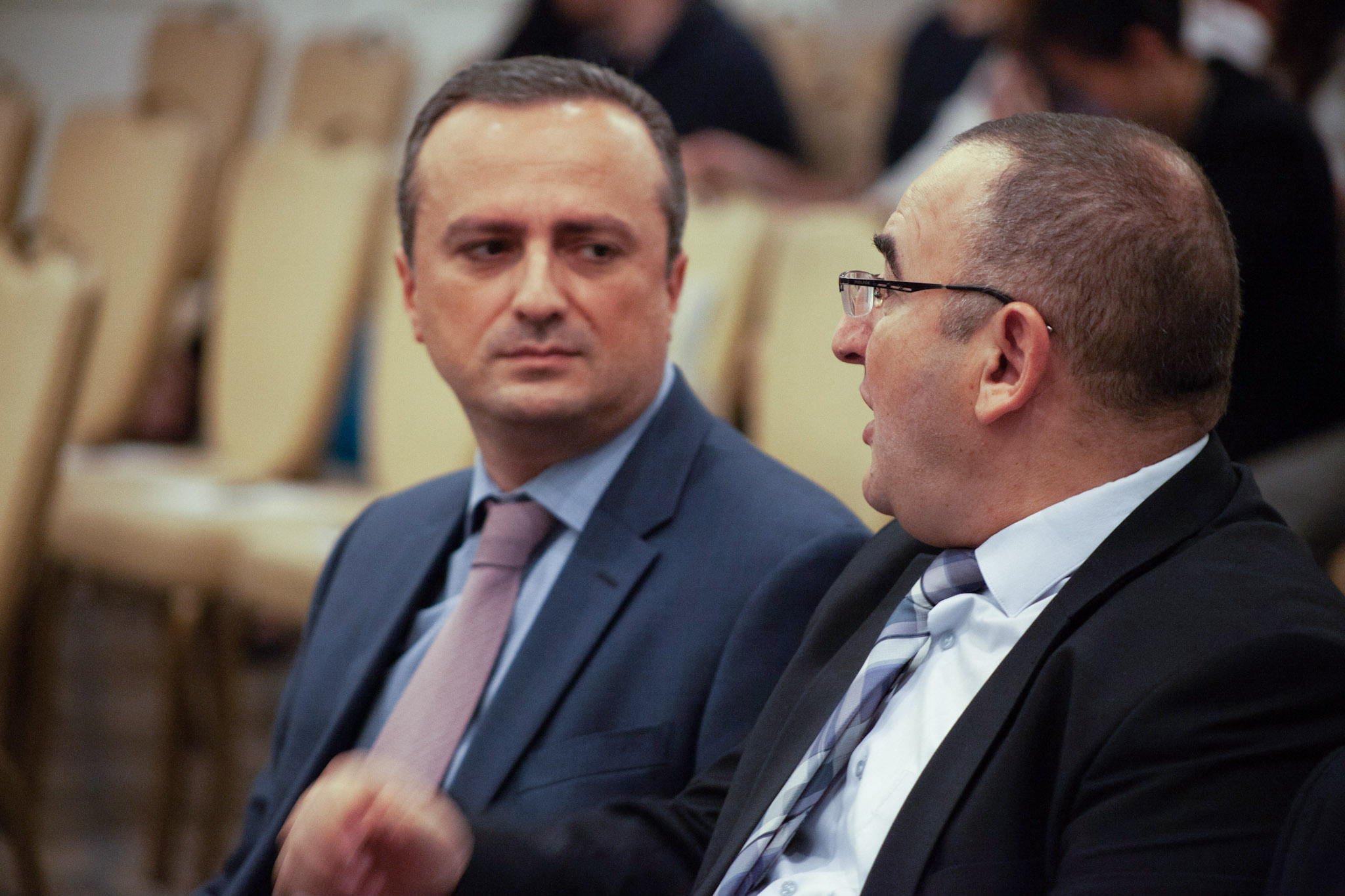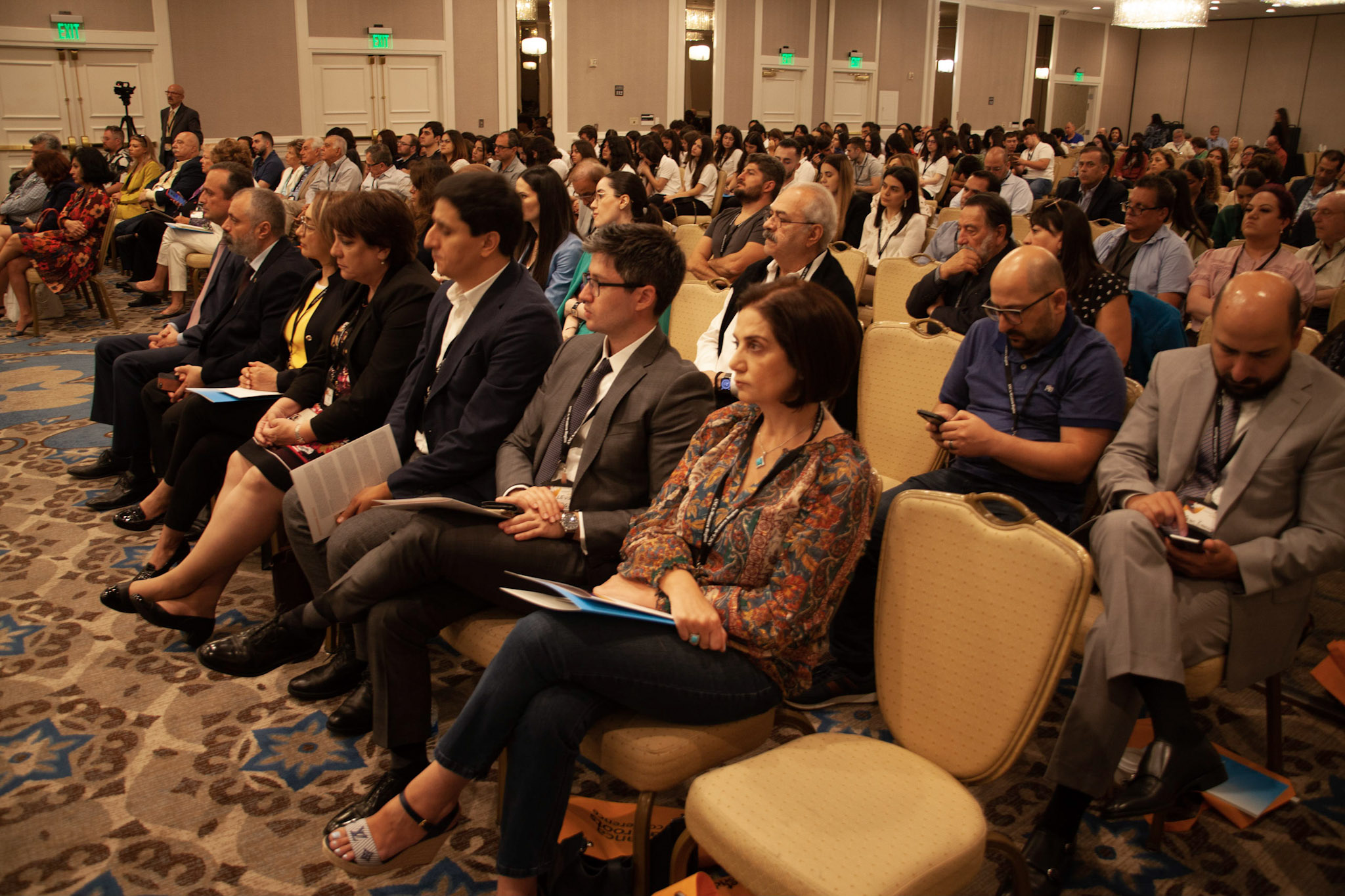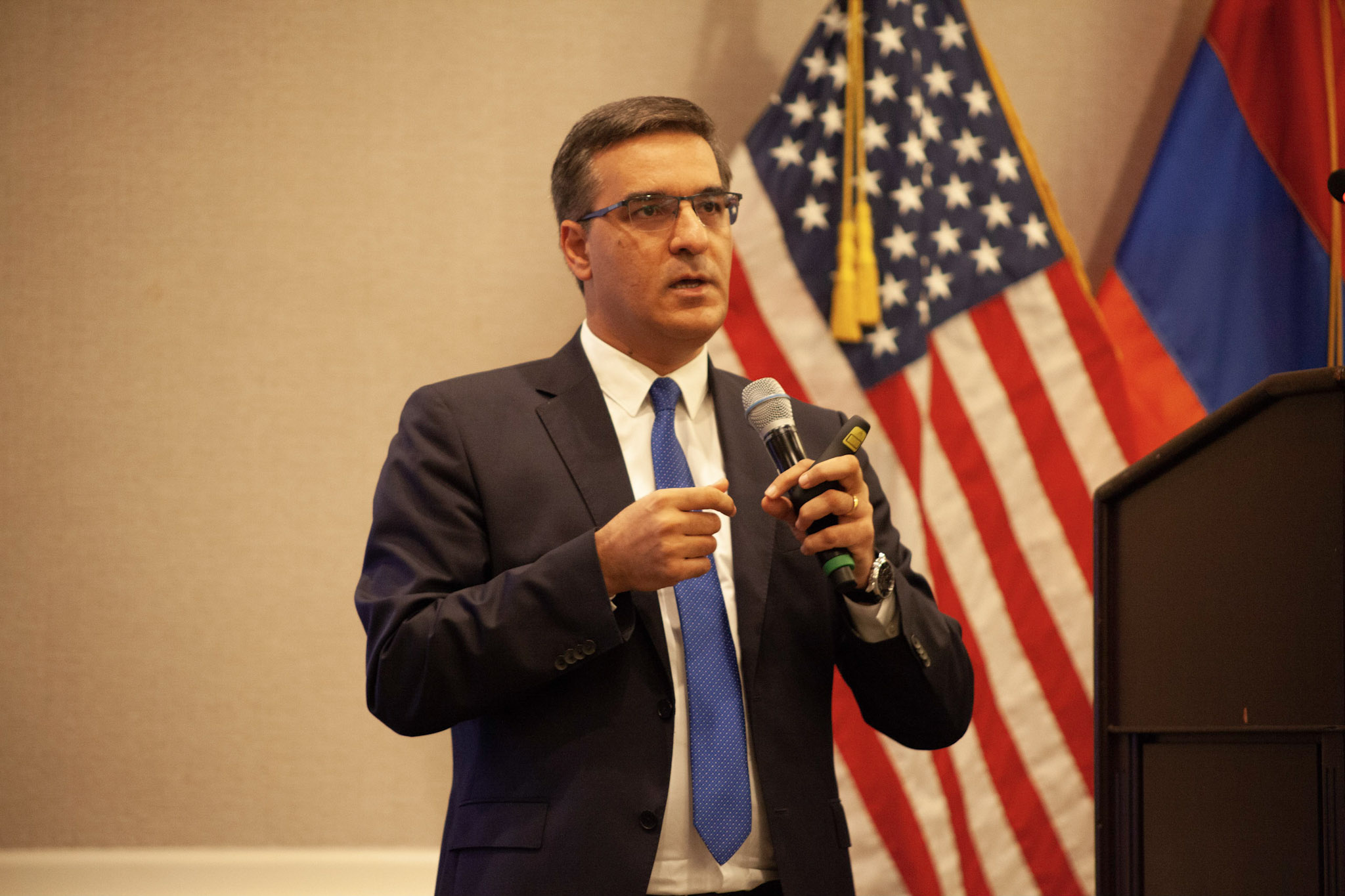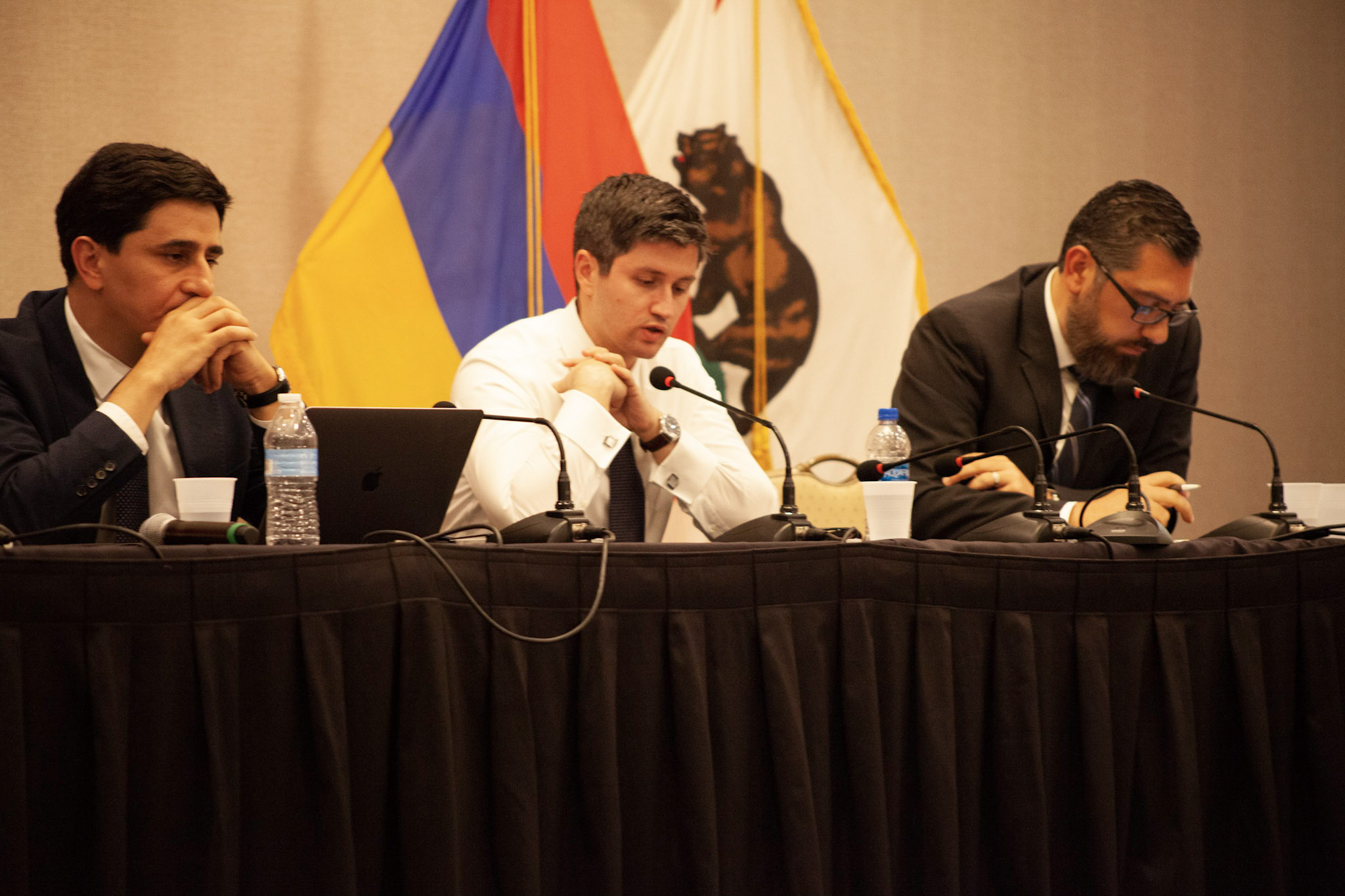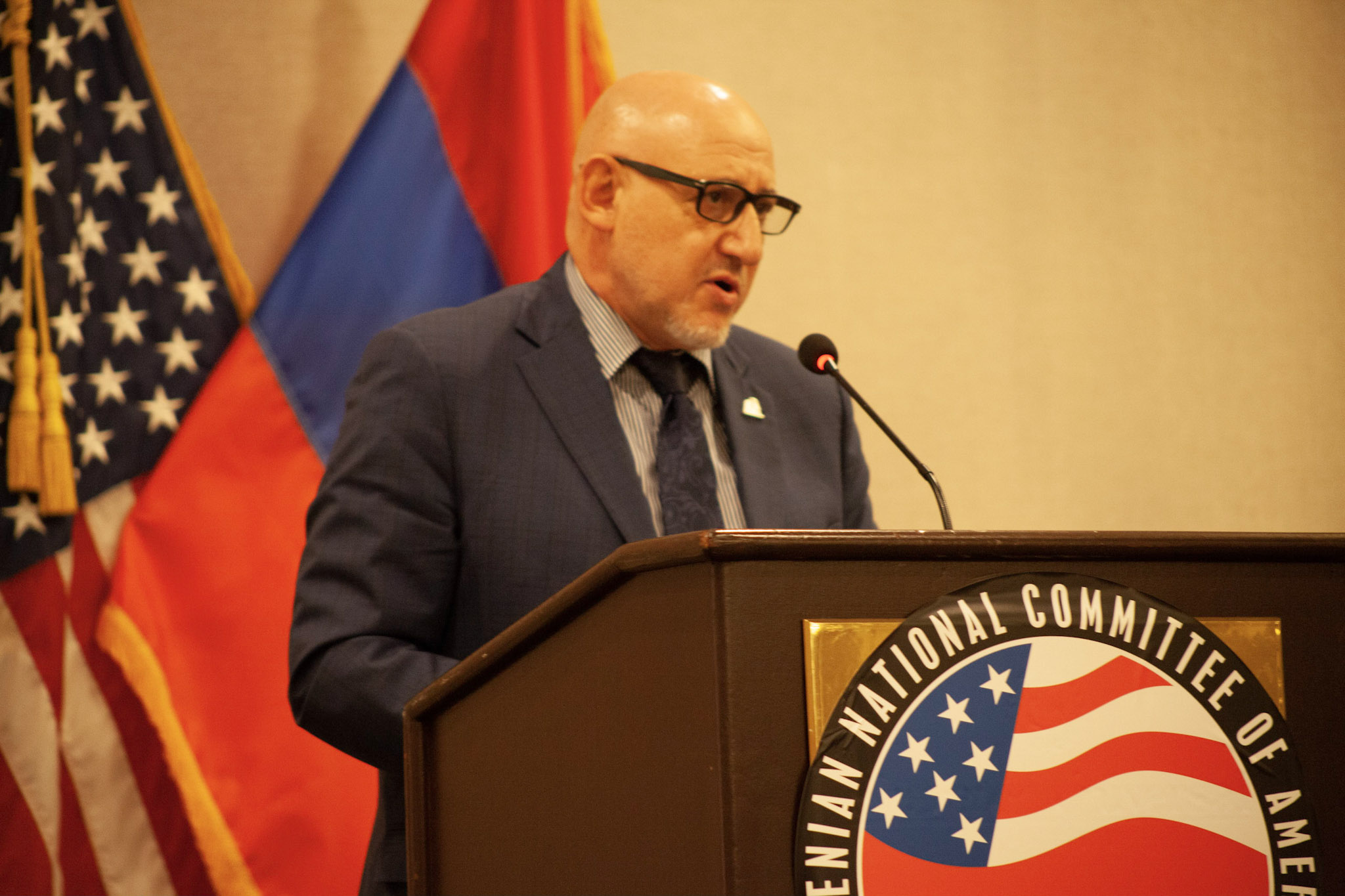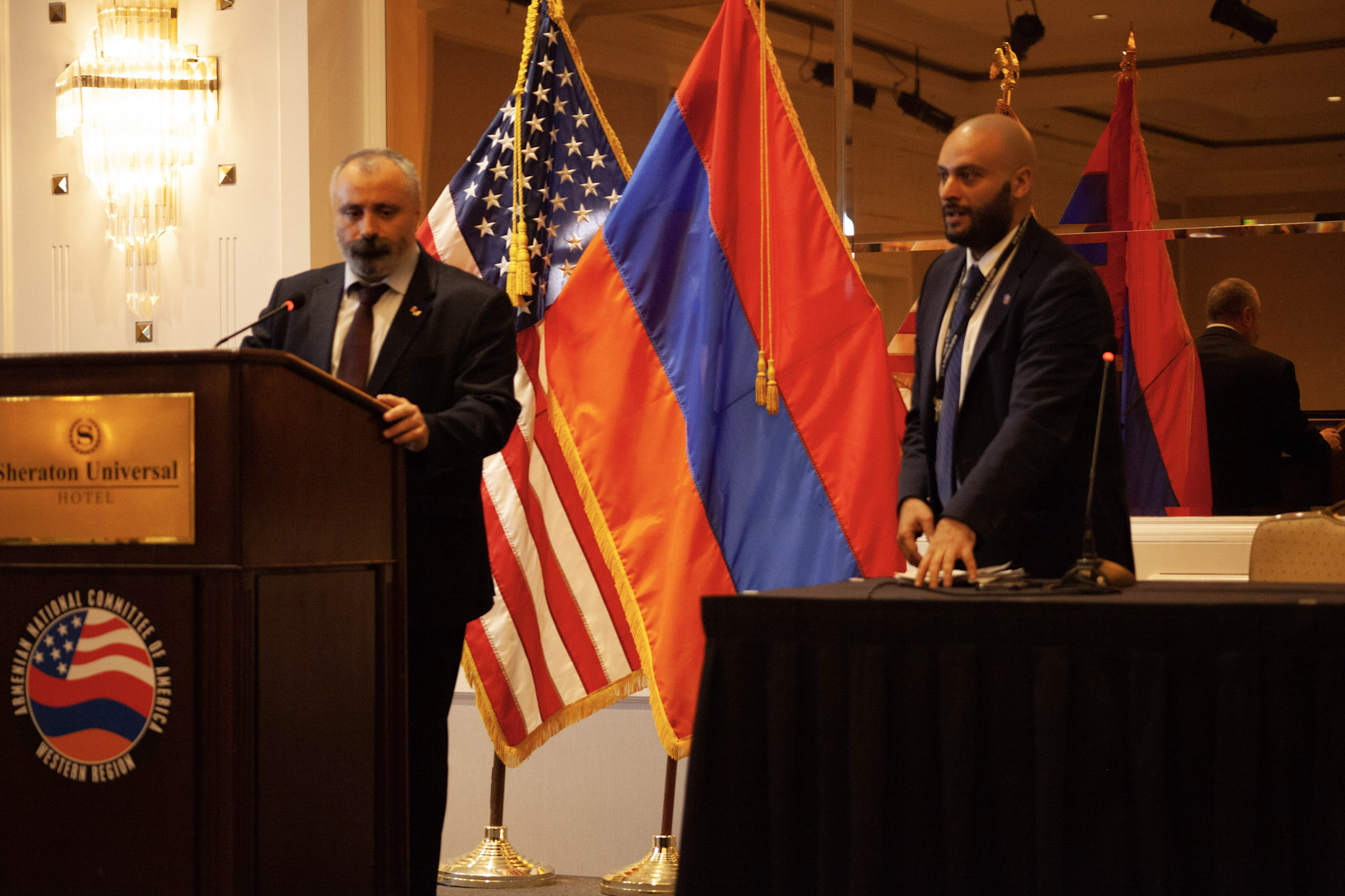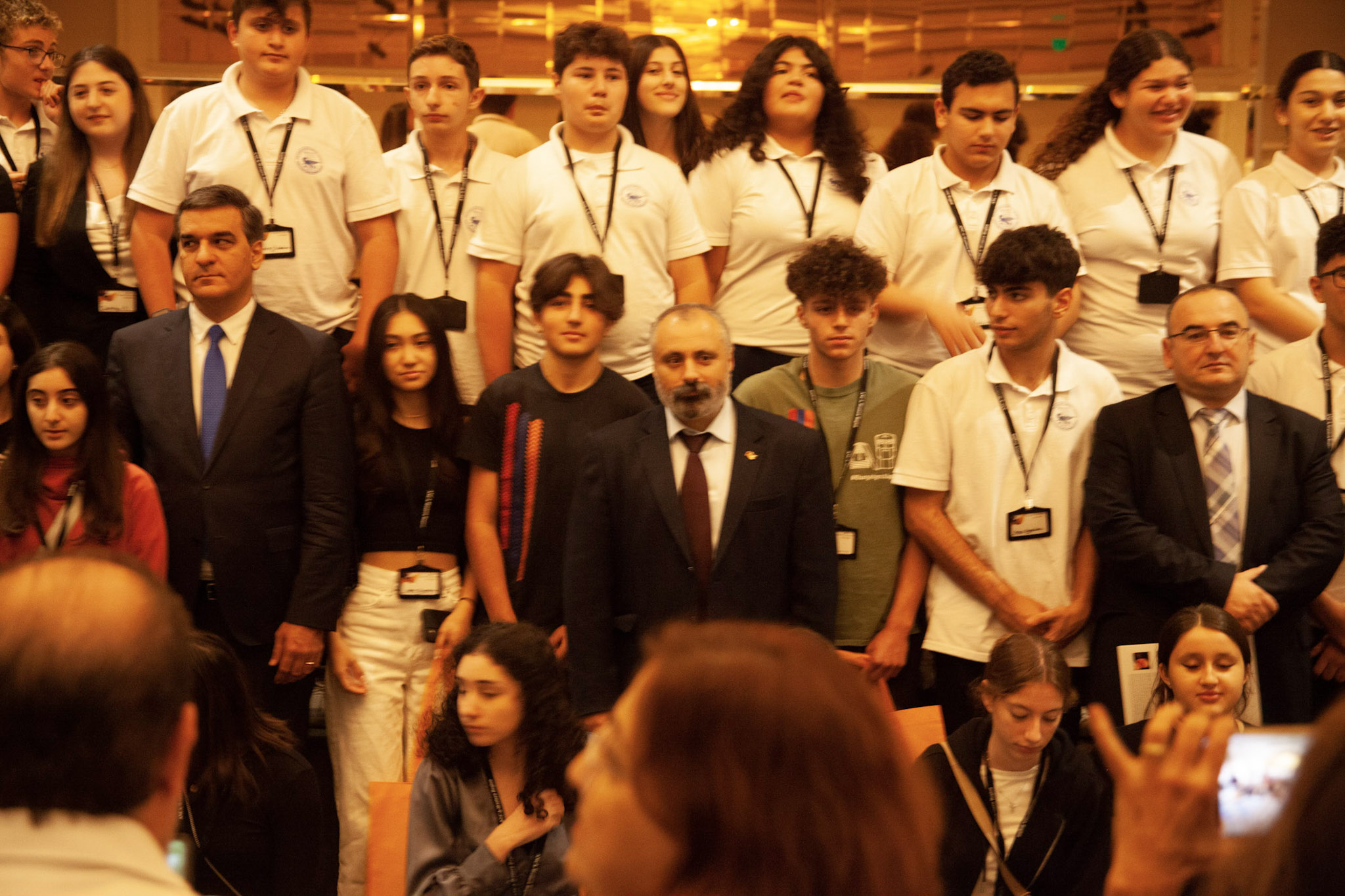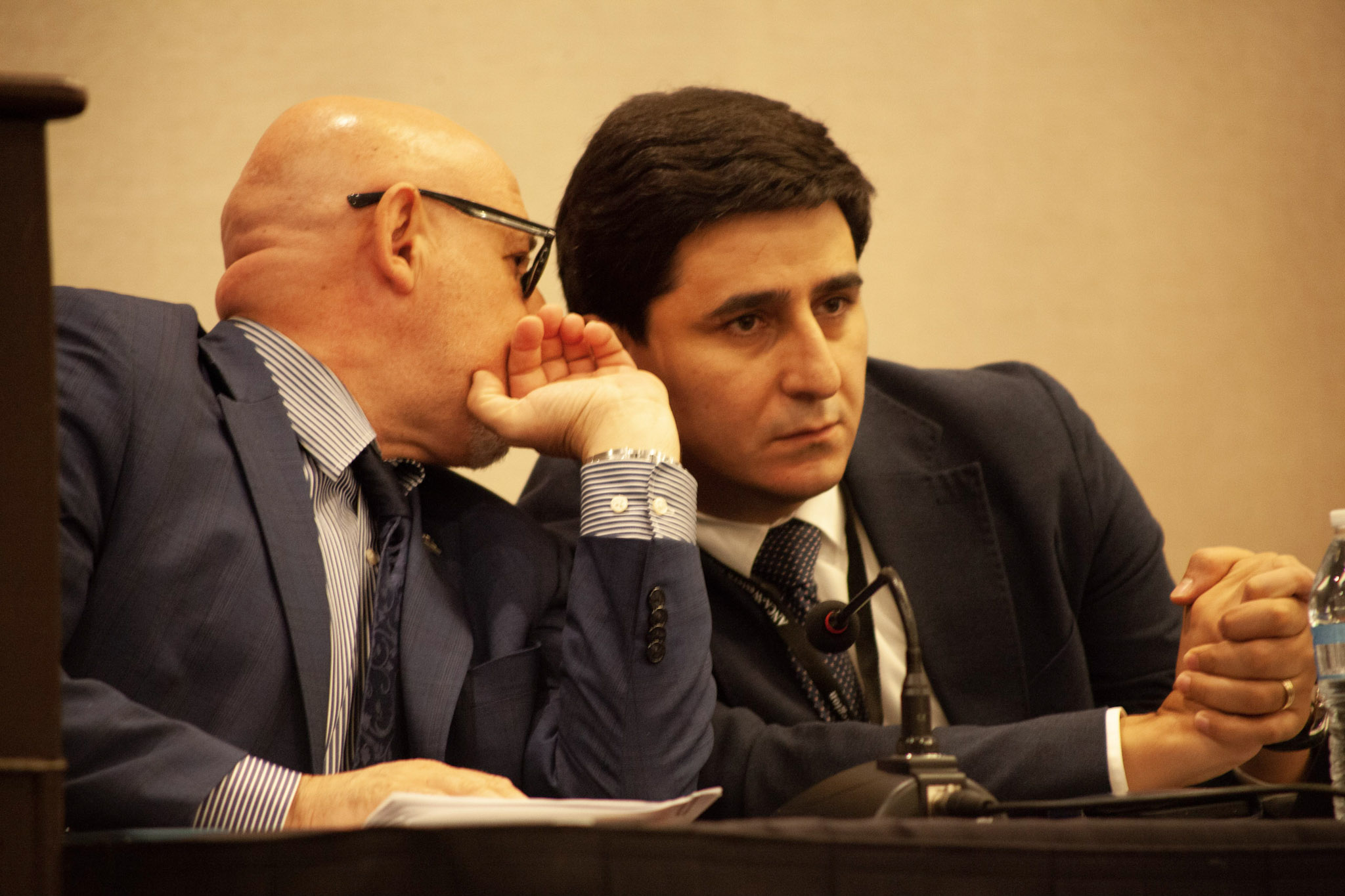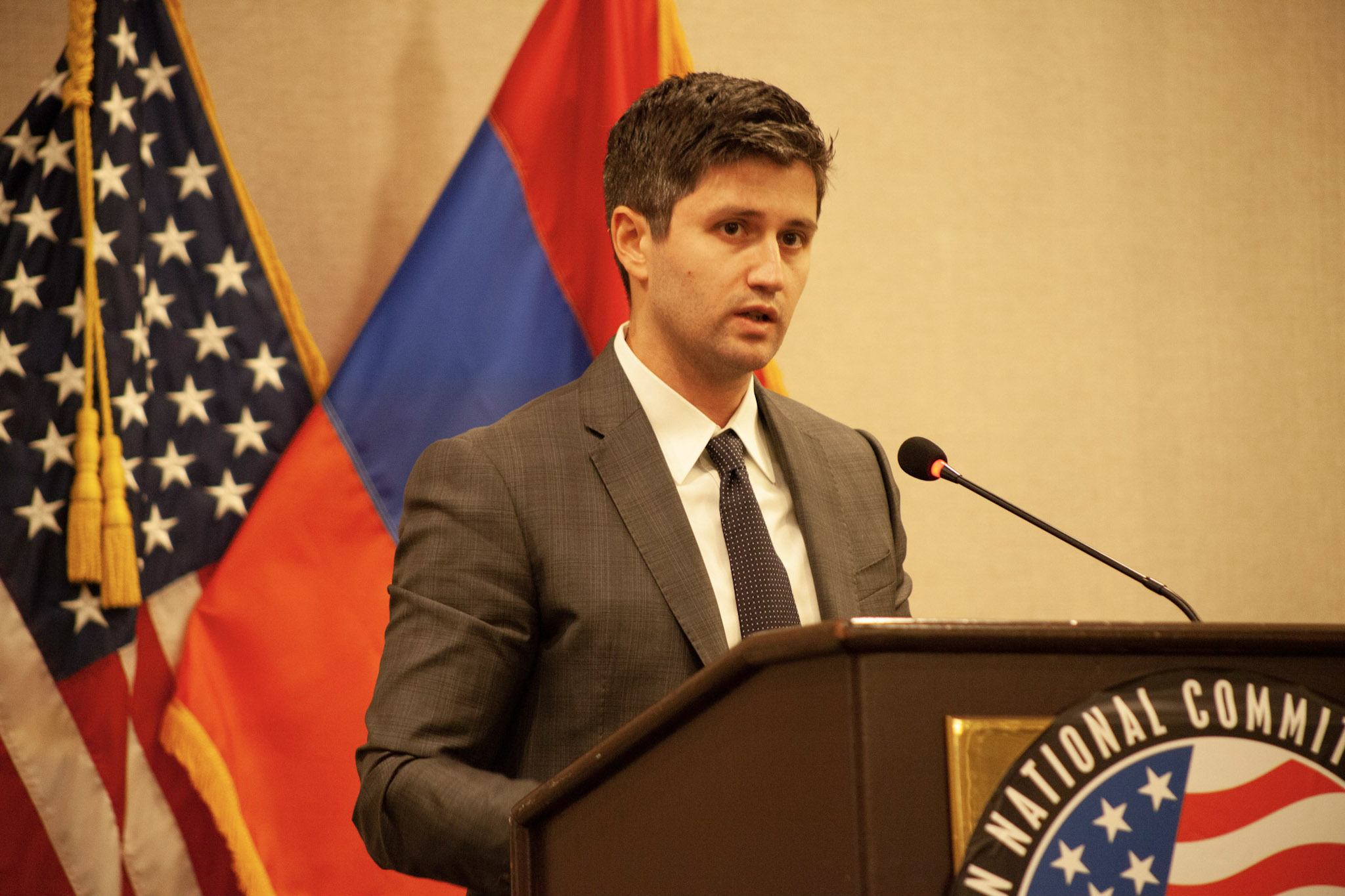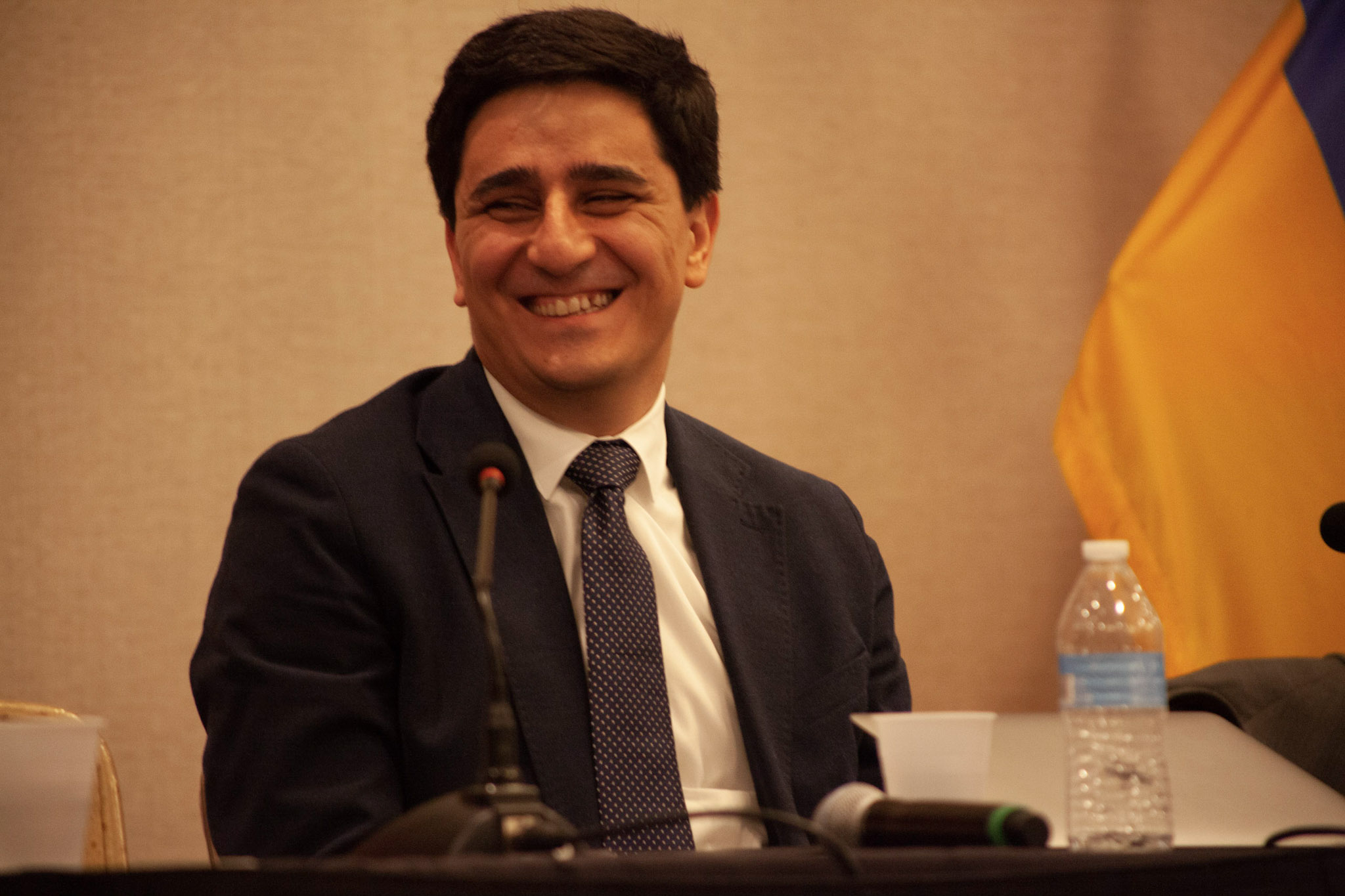Hundreds Attend ANCA-Western Region Grassroots Conference for Artsakh
December 1, 2022Hundreds of community leaders, members, youth, media personnel, scholars and activists gathered at the Sheraton Universal Hotel on September 24, 2022 for the 6th biennial Armenian National Committee of America – Western Region Grassroots Conference dedicated to Artsakh. The conference featured experts from Armenia, Artsakh, and the United States in the fields of international law, politics, genocide studies, and international human rights and humanitarian law spearheaded by the keynote speaker of the conference Dr. Davit Babayan, then Foreign Minister of the Republic of Artsakh (currently Acting Foreign Minister) and recipient of the 2022 ANCA-Western Region’s Freedom Award.
ANCA-Western Region Board Member and Grassroots Conference Chair Lina Davidian, Esq., welcomed the attendees, highlighted the importance of dedicating the 2022 Grassroots Conference to Artsakh, and introduced the strategically selected themes of the conference panels: (1) “Prevention of Cultural Genocide,” (2) Q&A with Dr. Arman Tatoyan on the situation at the border of Armenia-Azerbaijan and Azerbaijan’s ongoing violations of international law; (3) Keynote Speech by Artsakh Foreign Minister Dr. Davit Babayan; and (4) “International Justice” presentation and discussion featuring three members of the Republic of Armenia’s legal team in the cases against Azerbaijan at the International Court of Justice and European Court of Human Rights led by Dr. Yeghishe Kirakosyan, Armenia’s representative to both tribunals.
 ANCA-WR Board Member Anahid Oshagan, Esq., introduced the panelists of the “Prevention of Cultural Genocide” panel, featuring educator, historian, politician, and Deputy Minister of Culture and Youth of the Nagorno-Karabakh (Artsakh) Republic Dr. Lernik Hovhannisyan, Associate Professor in Technology and Social Justice at ArtCenter College of Design Dr. Mashinka Firunts Hakopian, and researcher, activist and academic Simon Maghakyan who also served as moderator. These scholars and specialists addressed the existential threats faced by Artsakh’s monuments, especially in territories occupied by Azerbaijan since the 2020 Artsakh War including Shushi and Hadrut, and discussed pathways for the protection of Armenian historical and cultural sites.
ANCA-WR Board Member Anahid Oshagan, Esq., introduced the panelists of the “Prevention of Cultural Genocide” panel, featuring educator, historian, politician, and Deputy Minister of Culture and Youth of the Nagorno-Karabakh (Artsakh) Republic Dr. Lernik Hovhannisyan, Associate Professor in Technology and Social Justice at ArtCenter College of Design Dr. Mashinka Firunts Hakopian, and researcher, activist and academic Simon Maghakyan who also served as moderator. These scholars and specialists addressed the existential threats faced by Artsakh’s monuments, especially in territories occupied by Azerbaijan since the 2020 Artsakh War including Shushi and Hadrut, and discussed pathways for the protection of Armenian historical and cultural sites.
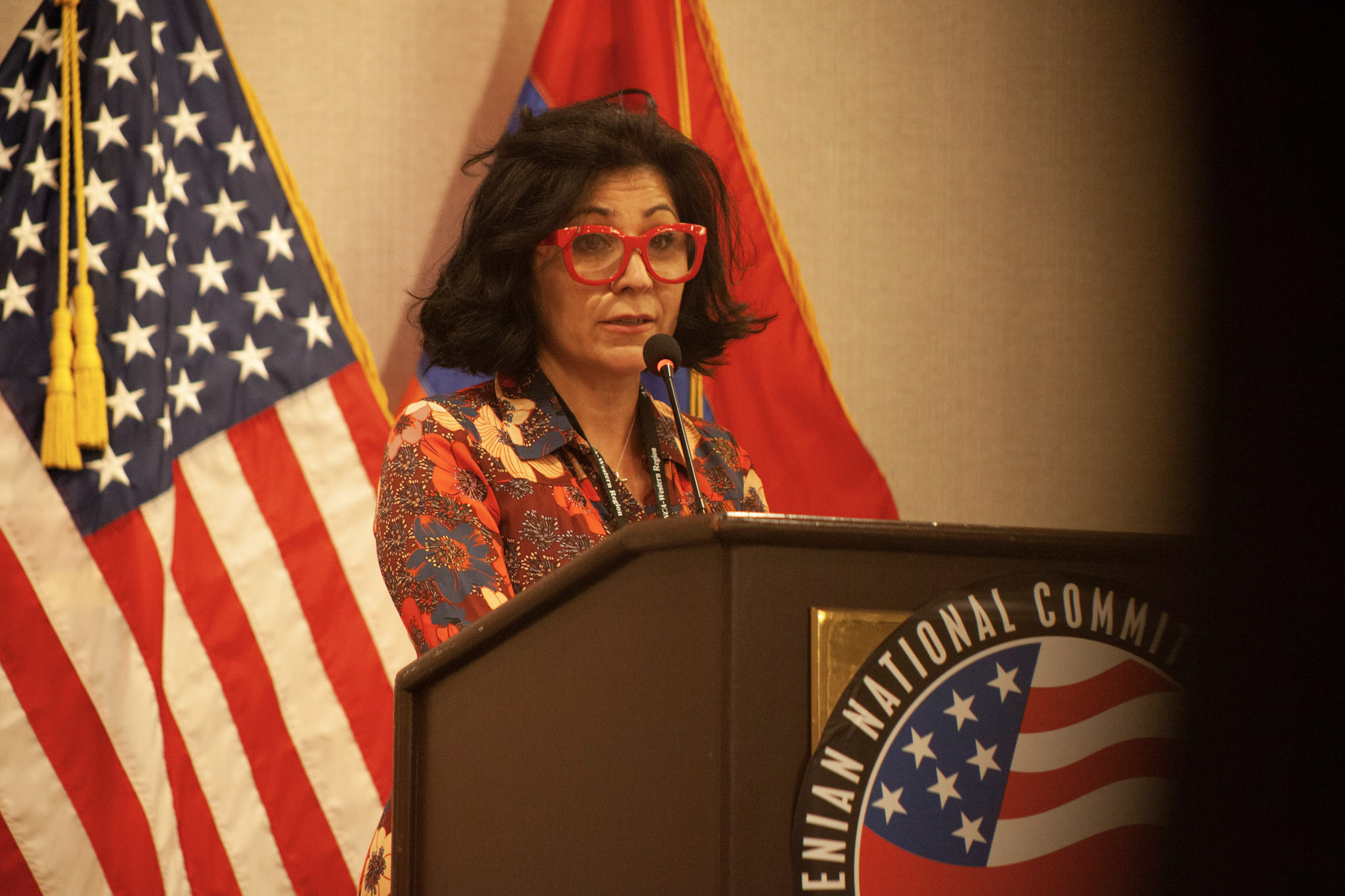 Dr. Lernik Hovhannisyan’s presentation was focused on the importance of preservation of centuries old Armenian cultural sites in territories occupied by Azerbaijan, highlighting the systematic cultural genocide campaign launched by the Azerbaijani government to eradicate more than 2,000 Armenian cultural sites, including the desecration of Khatchkars (Cross Stones), tombstones, churches, and other such monuments. Dr. Hovhannisyan emphasized how Azerbaijan’s dictator Aliyev has launched a campaign to distort historical facts by presenting Armenian religious sites to the world as Albanian Christian sites. Moreover, Dr. Hovhannisyan highlighted numerous instances of destruction of Armenian holy sites in Hadrut and other locations in Artsakh which have been occupied by Azerbaijan with a compelling video presentation.
Dr. Lernik Hovhannisyan’s presentation was focused on the importance of preservation of centuries old Armenian cultural sites in territories occupied by Azerbaijan, highlighting the systematic cultural genocide campaign launched by the Azerbaijani government to eradicate more than 2,000 Armenian cultural sites, including the desecration of Khatchkars (Cross Stones), tombstones, churches, and other such monuments. Dr. Hovhannisyan emphasized how Azerbaijan’s dictator Aliyev has launched a campaign to distort historical facts by presenting Armenian religious sites to the world as Albanian Christian sites. Moreover, Dr. Hovhannisyan highlighted numerous instances of destruction of Armenian holy sites in Hadrut and other locations in Artsakh which have been occupied by Azerbaijan with a compelling video presentation.
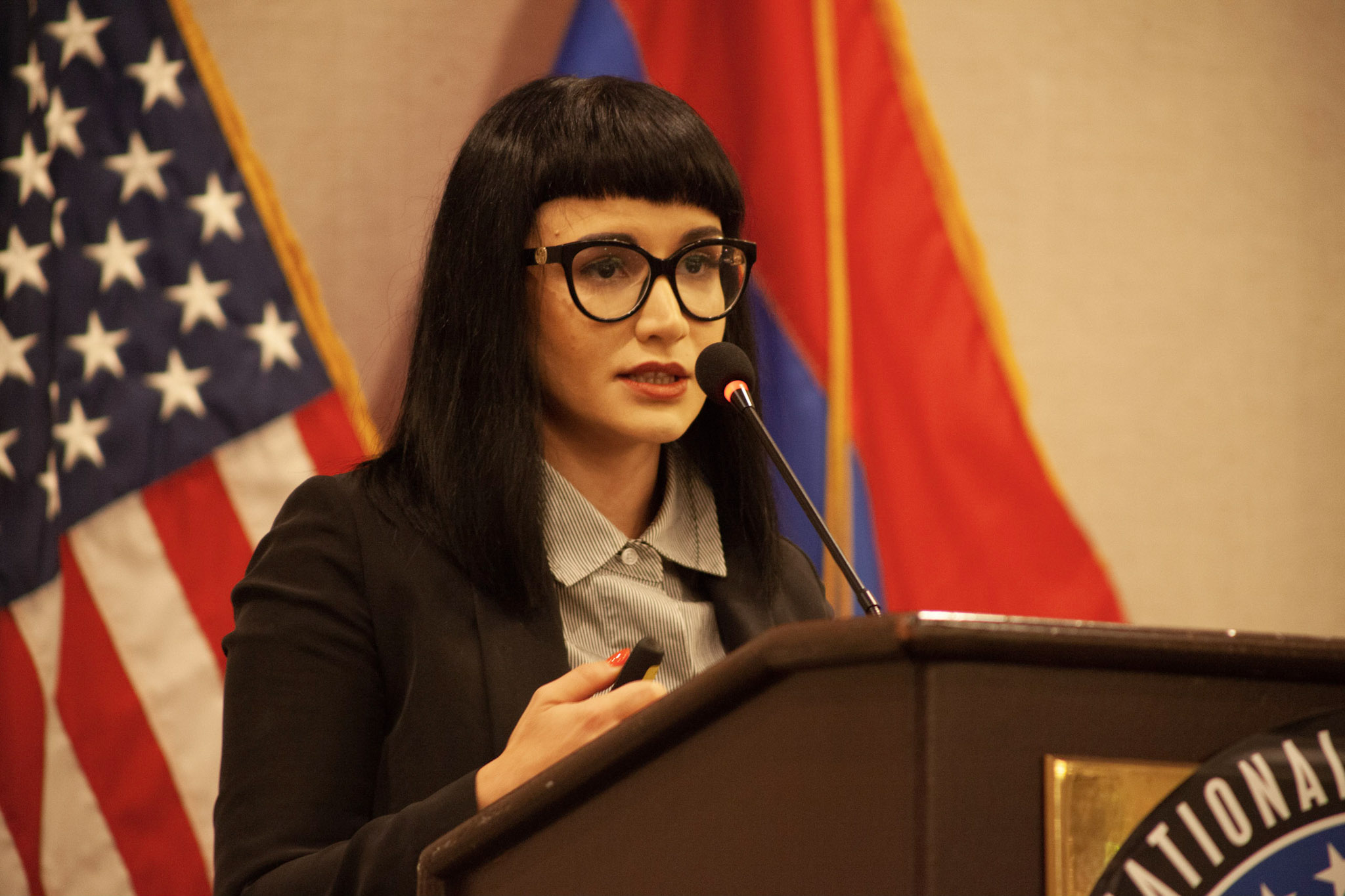 Dr. Mashinka Firunts Hakopian focused her presentation on the concept of Armenian indigeneity: indigenous Armenian cultural artifacts in the South Caucasus region, the Azerbaijani methods of material and digital erasure of Armenian culture in Artsakh, and the response of diaspora-based artists against the cultural genocide campaign waged by the Aliyev regime. Dr. Hakopian’s presentation featured “Msho Charentir”: an ancient manuscript made of the leather of one heifer or steer. Initially the manuscript had 660 sheets; 17 of them now are kept in Venice. This Armenian manuscript suffered the impact of previous campaigns of cultural genocide perpetrated by Ottoman Turkey. Until the beginning of the Armenian Genocide of 1915, it was kept in St. Arakelots monastery of Mush (from where the name of the manuscript derives), and during the genocide, it was rescued by two Armenian women who divided it into 2 parts and brought it to Eastern Armenia (current day Republic of Armenia).
Dr. Mashinka Firunts Hakopian focused her presentation on the concept of Armenian indigeneity: indigenous Armenian cultural artifacts in the South Caucasus region, the Azerbaijani methods of material and digital erasure of Armenian culture in Artsakh, and the response of diaspora-based artists against the cultural genocide campaign waged by the Aliyev regime. Dr. Hakopian’s presentation featured “Msho Charentir”: an ancient manuscript made of the leather of one heifer or steer. Initially the manuscript had 660 sheets; 17 of them now are kept in Venice. This Armenian manuscript suffered the impact of previous campaigns of cultural genocide perpetrated by Ottoman Turkey. Until the beginning of the Armenian Genocide of 1915, it was kept in St. Arakelots monastery of Mush (from where the name of the manuscript derives), and during the genocide, it was rescued by two Armenian women who divided it into 2 parts and brought it to Eastern Armenia (current day Republic of Armenia).
“The women who carried the Msho Charentir to Eastern Armenia [during the Armenian Genocide] made a claim for the future,” said Dr. Mashinka Hakopian. “A claim that there would be Armenian descendants in the future to receive this cultural artifact, despite all attempts to eradicate them.”
Moderator and panelist Simon Maghakyan provided a comprehensive depiction of Azerbaijani and Turkish systematic destruction of Armenian monuments in Nakhichevan, historically part of Armenia. In a profound effort to keep the legacy of the late Samvel Karapetyan, Mr. Maghakyan highlighted the importance of Nakhichevan as a region and the significance of destruction as testimony of the cultural genocide campaign waged by Turkish and Azeri regimes against Armenians through the desecration of cemeteries and thousands of cross stones.
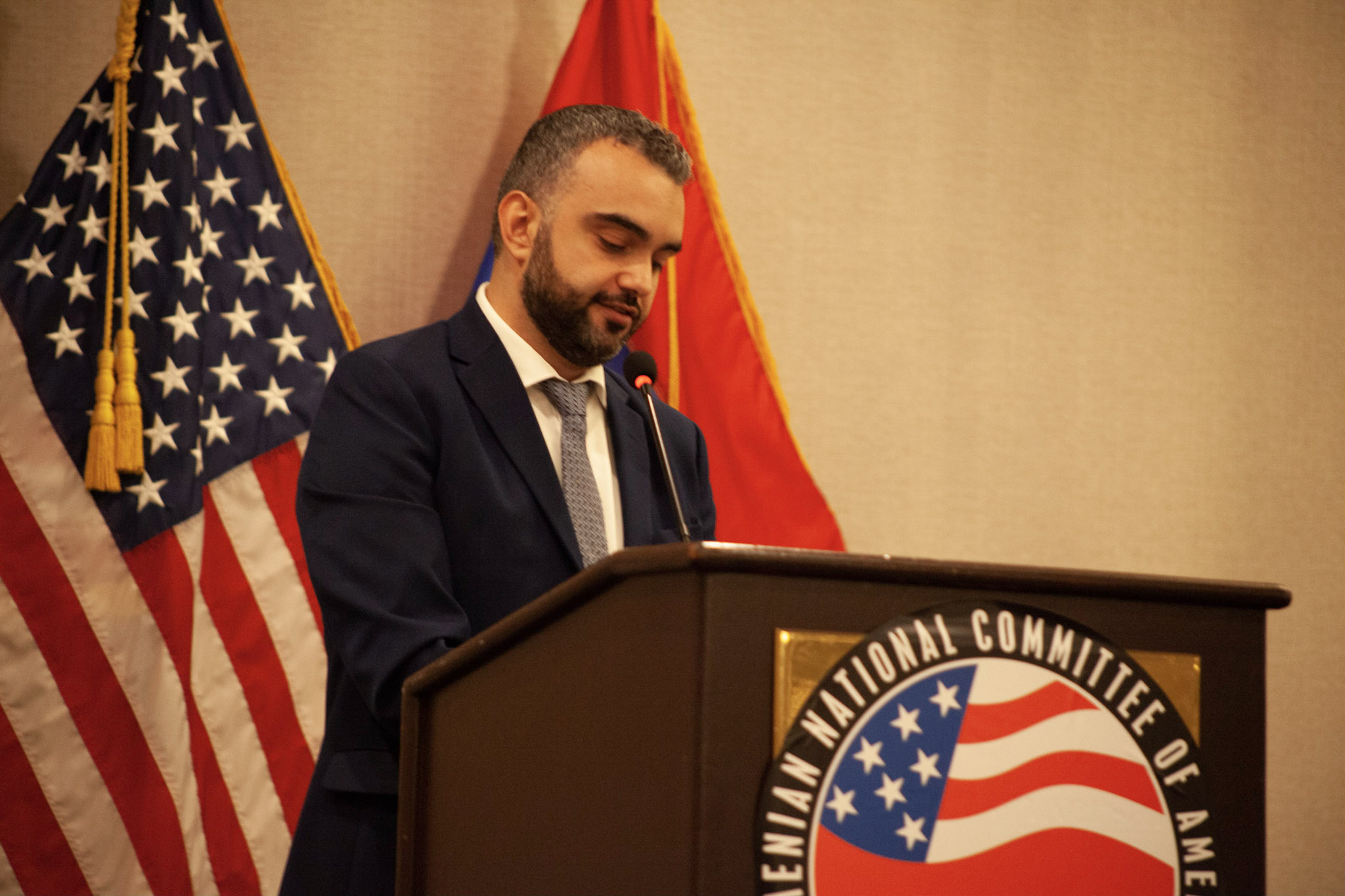 Subsequently, ANCA-Western Region Board Member Lena Bozoyan introduced the distinguished speaker of the “Q&A Session with Dr. Arman Tatoyan.” The session featured an elaborate presentation by Dr. Tatoyan, the former Ombudsman (Human Rights Defender of the Republic of Armenia) and founder of the Tatoyan Foundation’s Center for Law and Justice who has been on the frontlines of the legal struggle to halt Azerbaijan’s continued aggression against the Republic of Armenia and its sovereign territories in Syunik, Gegharkunik and Vayots Tsor Provinces since the conclusion of the 2020 Artsakh War.
Subsequently, ANCA-Western Region Board Member Lena Bozoyan introduced the distinguished speaker of the “Q&A Session with Dr. Arman Tatoyan.” The session featured an elaborate presentation by Dr. Tatoyan, the former Ombudsman (Human Rights Defender of the Republic of Armenia) and founder of the Tatoyan Foundation’s Center for Law and Justice who has been on the frontlines of the legal struggle to halt Azerbaijan’s continued aggression against the Republic of Armenia and its sovereign territories in Syunik, Gegharkunik and Vayots Tsor Provinces since the conclusion of the 2020 Artsakh War.
Following the Q&A Session with Dr. Tatoyan, nearly 400 guests attended a luncheon featuring the Keynote Speech by then Foreign Minister of the Republic of Artsakh Davit Babayan. Introducing Dr. Babayan was ANCA-Western Region Chair Nora Hovsepian Esq., who noted: “Following Azerbaijan’s recent invasion of the sovereign territories of Armenia last week we considered canceling the 2022 Grassroots Conference on Artsakh. However, when we reached out to several of our panelists to see if they preferred to cancel their visit to the US, they unequivocally affirmed their commitment to attend ANCA-Western Region’s Grassroots Conference because they were not going to allow any Azeri invasion to force us to stop our work.”
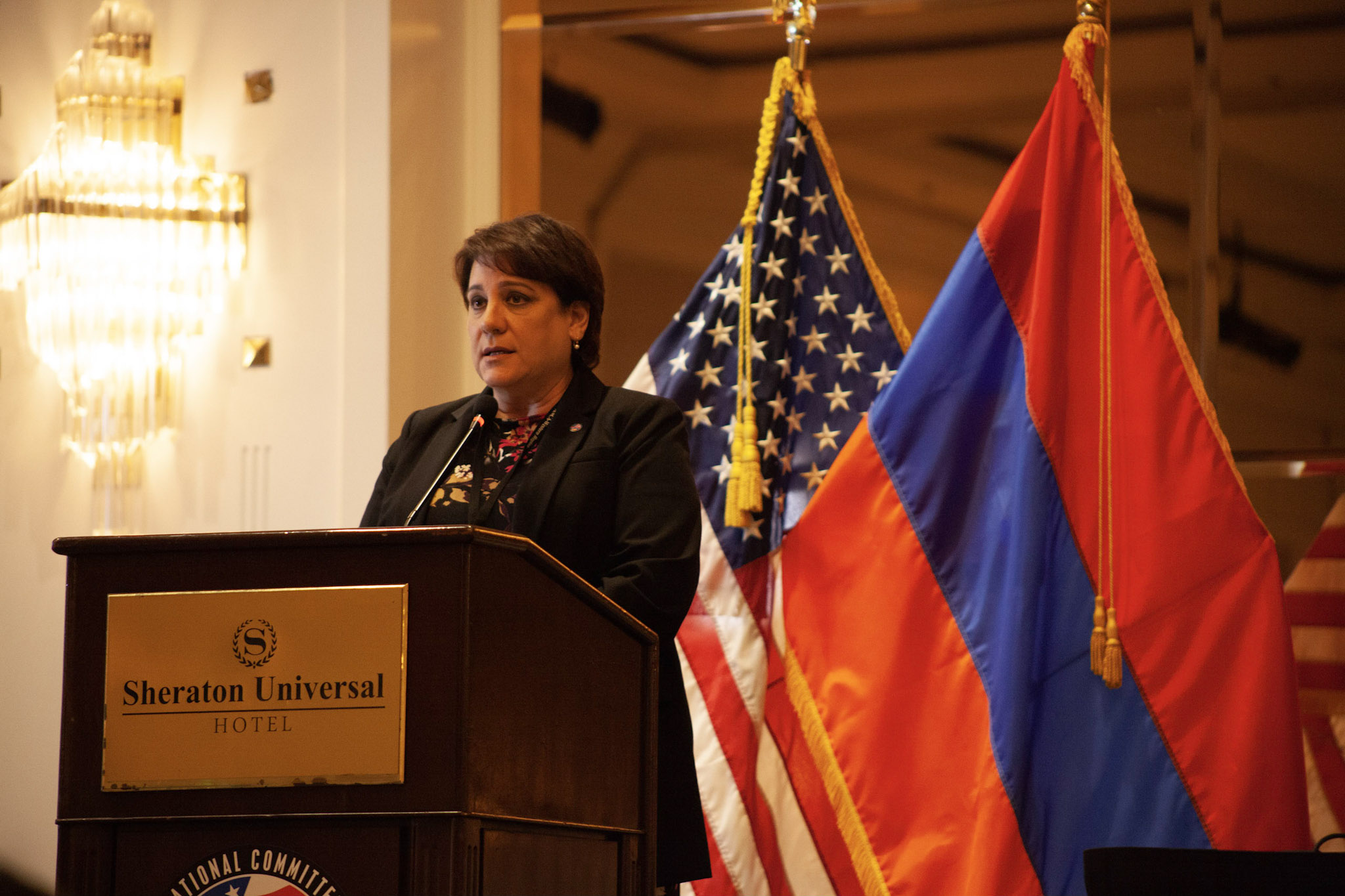 FM Babayan’s extensive knowledge of the geopolitical landscape of the region afforded an invaluable opportunity for the Armenian American community to understand the current security, humanitarian, and political situation surrounding Artsakh, Armenia and the region.
FM Babayan’s extensive knowledge of the geopolitical landscape of the region afforded an invaluable opportunity for the Armenian American community to understand the current security, humanitarian, and political situation surrounding Artsakh, Armenia and the region.
Dr. Babayan emphatically called the community to action by proclaiming, “Don’t think that we are crushed or unable to defend ourselves… Without Artsakh there will be no Armenia. Without Armenia our beloved Diaspora will vanish. This is why I call upon all of you, my brothers and sisters, to make Artsakh the central cause of our collective nation. We have very little time to organize ourselves if we are to survive as a nation.”
Finally, the “International Justice” panel was moderated by long-time community activist and legal expert Garo Ghazarian, Esq., and featured three members of Republic of Armenia’s Legal Team at the International Court of Justice. Dr. Yeghishe Kirakosyan was joined by attorneys Dr. Levon Gevorgyan, and Dr. Karnig Kerkonian to present some of the intricacies of the ongoing case of Armenia vs. Azerbaijan at the International Court of Justice, the principal judicial organ of the United Nations. The members of the legal team called upon on the tribunal to “protect and preserve Armenia’s rights and the rights of Armenians from further harm” citing the urgency of international intervention for the sake of Armenia’s security.
Dr. Yeghishe Kirakosyan stated: “As a country and nation, when we are complaining about the challenges we are facing today, we have to be mindful of our own shortcomings and mistakes… From the first day of our independence, as a sovereign state, what we should have pursued is the triggering of international legal tools, and using international law. We did not only fail to do so as a Republic of Armenia but also in the context of the Artsakh conflict as well… Although we are late now, it is better late than never… We must ensure that no settlement of the Artsakh Conflict is reached prior to the final judgment of the International Court of Justice.”
The 2022 ANCA-Western Region Grassroots Conference was sponsored through the generosity of Mr. & Mrs. Sarkis and Nune Sepetjian, enabling the participation of more than 100 students from local Armenian high schools alongside several hundred attendees.
The Armenian National Committee of America-Western Region is the largest and most influential Armenian American grassroots advocacy organization in the Western United States. Working in coordination with a network of offices, chapters, and supporters throughout the Western United States and affiliated organizations around the country, the ANCA-WR advances the concerns of the Armenian American community on a broad range of issues.
